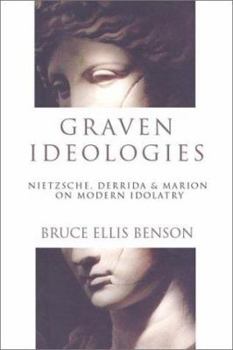Graven Ideologies: Nietzsche, Derrida Marion on Modern Idolatry
Select Format
Select Condition 
Book Overview
What do the philosophers Friedrich Nietzsche, Jacques Derrida and Jean-Luc Marion have in common with Christianity? Surprisingly, they are all concerned about idolatry, about the tendency we have to create God in our own image and about what we can do about it. Can we faithfully speak of God at all without interposing ourselves? If so, how? Bruce Ellis Benson explores this common concern by clearly laying out the thought of each of these postmodern...
Format:Paperback
Language:English
ISBN:0830826793
ISBN13:9780830826797
Release Date:July 2002
Publisher:IVP Academic
Length:243 Pages
Weight:0.80 lbs.
Dimensions:0.7" x 6.1" x 8.9"
Customer Reviews
2 ratings
a solid cursory exposition
Published by Thriftbooks.com User , 19 years ago
those who will find this book helpful are college majors and dabblers, these are also the individuals Benson has written this text for. It will also help those of us who need to brush up on our basic grasp of these figures and their additions to questions of religious speech and truth. if you read this book, you will be able to score chicks at bars....
Lucid Exposition of Religious Turn in Phenomenology
Published by Thriftbooks.com User , 21 years ago
Bruce Benson has written the clearest treatment of the religious turn in phenomenology in print. Focusing on the idol as a root metaphor for the human proclivity to absolutize conceptual constructs, the author takes us on a tour from Nietzsche to Jean-luc Marion explaining their struggle to speak about the Other in a non-metaphysical idiom; that is to say, in a manner that will remain vigilant of the inadequacy of all possible idioms. Philosophy's conceit that it could ground its epistemological claims and subjugate the Real via rational schemas proved to be a delusion. The story of that delusion culminated in the death of God and the reductio ad absurdum of the modernist project at Auschwitz. The only serious flaw in the book was the author's exposition of Heidegger which lacked sufficient depth. Heidegger represents an epochal shift in the consciousness of the Western tradition, a mode of thinking which evolved from the classical paradigm of the form/particular (ideational/material), to critical reason and Kant's architectonic model of subjectivity. Hegel's transitional thinking toward a deeper awareness of the historical conditioning of mind, as well as the evolutionary unfolding of consciousness as a universal phenomenon, laid the groundwork for a new, transpersonal gnosticism which would begin to manifest itself in the Heideggarian corpus. Heidegger's receptivity to the numinous, the uncanniness and mystery of Being - which opens up a horizon of luminosity (Lichtung, clearing) wherein Being can disclose itself to Da-sein - marked the beginning of a dialectical conversion to a trans-rational philosophical thinking. That is to say, a thinking which is willing to abandon the desire for conceptual closure or instrumental reason in order to explore its temporal nature and ontological contingency; and also a thinking which seeks to encounter the Other as Other. Heidegger thus provided the necessary impetus for both Derrida's deconstructive readings and Marion's abandonment of a theology ensconced in metaphysical categories.




